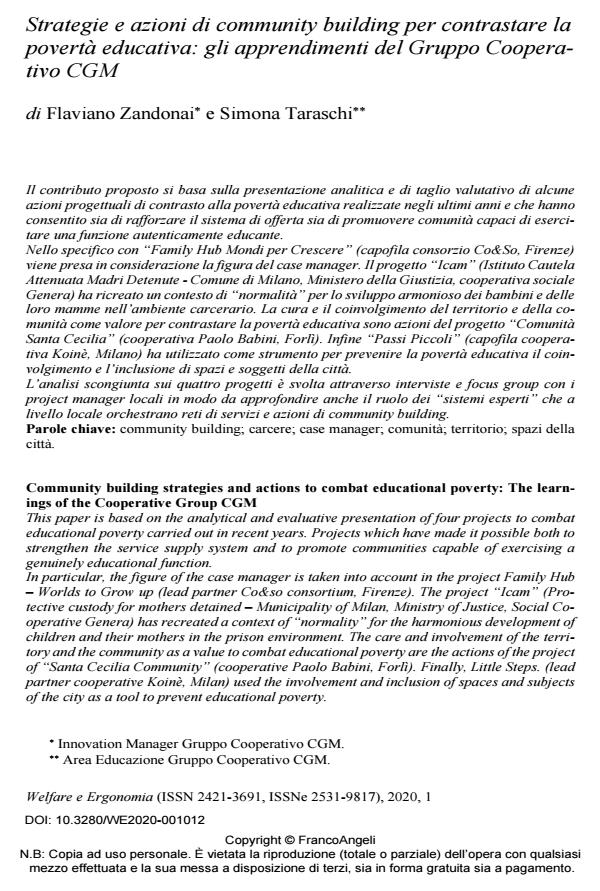Community building strategies and actions to combat educational poverty: The learn-ings of the Cooperative Group CGM
Journal title WELFARE E ERGONOMIA
Author/s Flaviano Zandonai, Simona Taraschi
Publishing Year 2020 Issue 2020/1
Language Italian Pages 12 P. 129-140 File size 400 KB
DOI 10.3280/WE2020-001012
DOI is like a bar code for intellectual property: to have more infomation
click here
Below, you can see the article first page
If you want to buy this article in PDF format, you can do it, following the instructions to buy download credits

FrancoAngeli is member of Publishers International Linking Association, Inc (PILA), a not-for-profit association which run the CrossRef service enabling links to and from online scholarly content.
This paper is based on the analytical and evaluative presentation of four projects to combat educational poverty carried out in recent years. Projects which have made it possible both to strengthen the service supply system and to promote communities capable of exercising a genuinely educational function. In particular, the figure of the case manager is taken into account in the project Family Hub - Worlds to Grow up (lead partner Co&so consortium, Firenze). The project "Icam" (Protec-tive custody for mothers detained - Municipality of Milan, Ministry of Justice, Social Cooper-ative Genera) has recreated a context of "normality" for the harmonious development of children and their mothers in the prison environment. The care and involvement of the terri-tory and the community as a value to combat educational poverty are the actions of the pro-ject of "Santa Cecilia Community" (cooperative Paolo Babini, Forlì). Finally, Little Steps. (lead partner cooperative Koinè, Milan) used the involvement and inclusion of spaces and subjects of the city as a tool to prevent educational poverty. The joint analysis of the four projects is carried out through interviews and focus groups with local project managers, in order to deepen the role of the "expert systems" that locally or-chestrate networks of services and community building actions.
Keywords: Community building; prison; case manager; community; territory; city spaces
- “Volontari per l’Educazione”: un’esperienza di sistema formativo allargato per il recupero degli apprendimenti Carlotta Bellomi, Giuseppina Rita Jose Mangione, in IUL Research 1/2023 pp.227
DOI: 10.57568/iulresearch.v4i8.500
Flaviano Zandonai, Simona Taraschi, Strategie e azioni di community building per contrastare la povertà educativa: gli apprendimenti del Gruppo Cooperativo CGM in "WELFARE E ERGONOMIA" 1/2020, pp 129-140, DOI: 10.3280/WE2020-001012